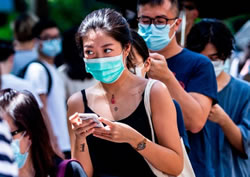 Insiders say Hong Kong’s National Security Law and the new oath of allegiance has changed the culture of the Public Service with workers now watching what they say around the office.
Insiders say Hong Kong’s National Security Law and the new oath of allegiance has changed the culture of the Public Service with workers now watching what they say around the office.
They say any comments that could be construed as critical of the Government or of mainland China are pounced on and reported by snitches jostling to demonstrate their loyalty.
Journalists uncovered the case of Alice (not her real name) who was working in a public-facing civilian job in one of Hong Kong’s disciplined services when she was transferred last year to the back office of another Government Department.
Her bosses had received an anonymous complaint about her.
She said she had only shared a news article about a police raid following the introduction of the National Security Law without adding any comments of her own.
“I was told that my personal beliefs might affect my performance at work, but that’s ridiculous,” Alice said.
Other sources and unionists say the culture in the city’s 180,000-strong Public Service changed radically after Beijing imposed the National Security Law, followed by the demand that workers sign an oath of allegiance to the Government.
The oath requirement is part of continuing efforts by the authorities to ensure that only ‘patriots’ run Hong Kong, but it has also encouraged snitching and apple-polishing at the workplace, the insiders and unionists said.
Like Alice, Executive Officer Joseph (also not his real name) has had to deal with complaints against him.
After more than a decade in his job, he found himself accused of violating the Public Service’s principle of political neutrality after commenting on anti-Government protests.
“You just cannot trust anyone; it has also prompted some of my colleagues to quit,” Joseph said.
Chief Executive of the Hong Kong Federation of Civil Service Unions, Leung Chau-ting said he understood there had been as many as 10,000 cases of Government workers snitching on colleagues.
“Not all allegations are substantiated, but the chilling effect in the workplace environment is significant,” Mr Leung said.
Hong Kong, April 27 2021




